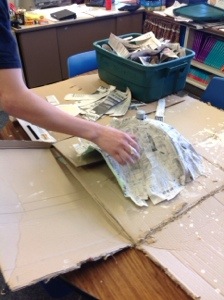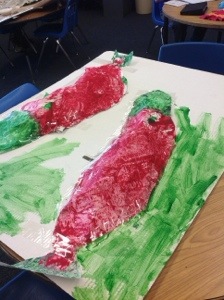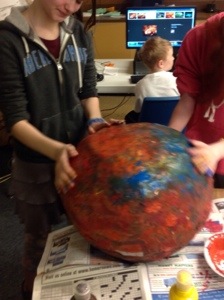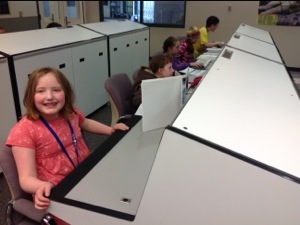The following is a piece written for the Alaska State Writing Consortium class in Homer. The process was an open-ended prompt of “Write a Biographical Sketch of a classmate.” Partners were assigned in a random manner, given an hour of time together for an initial interview, and then the partners met again the following day to review the first draft. Two days and several revisions later, a “final” copy is now on the internet for classmates’ comments as well as the perusal of any other readers.
_________________________________________________
Alongside
“Any situation in which some men prevent others from engaging in the process of inquiry is one of violence; … to alienate humans from their own decision making is to change them into objects.” ― Paulo Freire
What does it really mean for a person to have religious faith? Is it the faith of an institution or organization that defines this for an individual? Does faith come in the mysteries of legends and folklore, the shades between fact and fiction in a culture built on oral tradition? Or is it prescribed based on centuries of study, thought, reason, and emotion which culminates as the beliefs of a person’s soul?
Questions such as these weave through Ward Walker’s experiences in life and resonate now with him as the Principal/Teacher in False Pass, a small village on the eastern end of Alaska’s Aleutian chain. The village has long been a site of Aleut settlement, predating Russian fur traders who brought the first wave of the Western World to their shores. Since then the desire of remaining an autonomous indigenous culture within the larger world challenges both those on the inside and outside of that culture.
Ward’s role as principal allows him to engage in this discussion as a contributing member of the village, and he is even more open to the puzzle of tradition’s balance with progress in his home village of Stebbins. It was there as a Catholic Priest that he acutely felt the tension between the needs of the people and the rules of the Church, a tension which ultimately led him away from formal ministry and into education.
His is a varied past. Growing up in Canada, Ward struggled through elementary school with Dyslexia. A move to a different school changed that for him in sixth grade. He’d worked in school, but now found motivation to work even harder; as reading came together for him that year, so also did a faith in himself as a learner. In the speak-ese of schools, he was transformed from a D/F student to a regular on the Dean’s Honor Role. This new found confidence likely changed the outcome of his life.
He would find other lives to change. After a brief foray in Engineering studies, Ward moved to California to study theology at the University of Santa Clara. While in Southern California he worked with the Missionary Brothers of Charity, a Catholic order founded by Mother Theresa to minister to the “poorest of the poor” throughout the world. This became the primary step in a journey alongside people malnourished both in body and spirit: the poor of Guatemala, the orphans of Haiti, the mentally ill and disabled in the care of Franciscans, all people who the Western World casts aside in its relentless charge forward.
Ward’s work in the world draws on the writings of Paulo Freire, an educational philosopher from South America. Freire advocated “accompaniment” of indigenous peoples, that educators and others should come along side cultures as the culture itself works its way through the issues brought forth by an impassioned mainstream declaring all must be like the rest of the world. Summer work in Alaska provided a connection to the Alaska Native culture and he recognized this as the call of his mission, to practice the philosophies of Freire within his own country with those who would become family, friends and community.
Education is Ward’s current vehicle in this endeavor. He taught in the Western Alaskan villages of Selawick, Stebbins, and Gambell before his current position in False Pass. Recognizing the educational needs of his students, he completed a Special Education Endorsement as well as an Alaska administrative certificate from the University of Alaska Anchorage. He ultimately recognizes that for himself, education is a means for the significant work of accompaniment. It is in education that Ward looks to aid students and their communities to understand that the gifts and talents they bring are enough to improve life on their own, to become authors of their own future.
Ward is able to discuss the role of religious faith in the Native culture at length with the Russian Orthodox priest who travels to the village, as well as a Baptist missionary who seeks to save souls in this far flung village. Listening becomes discussing in these visits, and then encouragement for those men in their mission of shepherding their flocks in the village, albeit with very different traditions.
What then is the role of the Christian faith in a non-Western culture? Ward believes that the people are not interested in returning to the naturalistic shamanism of the past, but are seeking to express their beliefs in a manner that honors who they have been and who they are while communicating the central truths of their adopted religion. Most in False Pass attend the Russian Orthodox Church, but that institution has only been part of the region for a few hundred years. How does a culture far older than organized religion express its beliefs in a manner that touches the core of who they are as a people?
As he works together with his Native friends and family, Ward believes that the culture will come closer to an answer for that question. Perhaps the result will be an autonomous Christian church of blended traditions, or another reflective approach to the questions of faith in the world. Regardless, Ward’s commitment to come alongside his community on this journey of understanding will continue until the Word becomes flesh for them in ways that resonate with their past experiences and future dreams.



 Posted by Mrs. Stading
Posted by Mrs. Stading














